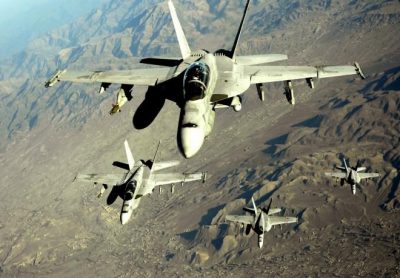UK Planning for Strikes Against ISIS in Afghanistan Says Head of Royal Air Force

All Global Research articles can be read in 51 languages by activating the “Translate Website” drop down menu on the top banner of our home page (Desktop version).
Visit and follow us on Instagram at @crg_globalresearch.
***
Within days of withdrawing the last British troops from Afghanistan after 20 years of warfare, the Ministry of Defence (MoD) is understood to be undertaking planning in order that the UK can launch airstrikes against ISIS in Afghanistan. The plans emerged after the Afghanistan branch of ISIS launched a suicide attack at Kabul airport during the chaotic evacuation, which killed a large number of civilians – 90 according to some reports – including two British men, and 13 US troops. Foreign secretary, Dominic Rabb signed a joint statement issued by the US-led coalition against ISIS saying that they would continue to “draw on all elements of national power—military, intelligence, diplomatic, economic, law enforcement—to ensure the defeat of this brutal terrorist organization.”
Head of RAF, Sir Mike Wigston told the Daily Telegraph
“If there’s an opportunity for us to contribute, I am in no doubt that we will be ready to. That will be anywhere where violent extremism raises its head and is a direct or indirect threat to the UK and our allies. Afghanistan is probably one of the most inaccessible parts of the world, and we’re able to operate there.”
British drone and other aircraft continue to undertake military operations against ISIS in Iraq and Syria, with more than 50 UK airstrikes (or ‘weapon release events’ as MoD now calls them) in first six months of 2021. In addition, UK Reaper drones have also been engaged in a covert operation about which government refuses to answer any questions.
It remains to be seen whether ‘planning’ turns into actual operations but launching such air strikes continues to kill innocent civilians. A US drone strike targeting a car carrying alleged suicide bombers in Kabul on 29 July, reportedly killed 10 civilian members of one family, including a number of children. According to the New York Times:
“Zemari Ahmadi, who worked for the charity organization Nutrition and Education International, was on his way home from work after dropping off colleagues on Sunday evening, according to relatives and colleagues interviewed in Kabul. As he pulled into the narrow street where he lived with his three brothers and their families, the children, seeing his white Toyota Corolla, ran outside to greet him. Some clambered aboard in the street, others gathered around as he pulled the car into the courtyard of their home.
It was then that they say the drone struck.
At the time of the attack, the Corolla was in a narrow courtyard inside a walled family compound. Its doors were blown out, and its windows shattered.
Mr. Ahmadi and some of the children were killed inside his car; others were fatally wounded in adjacent rooms, family members said. An Afghan official confirmed that three of the dead children were transferred by ambulance from the home on Sunday.”
A US military spokesperson said they weren’t in a position to dispute the civilian casualties but were investigating. They were quick, however, to suggest that casualties must have been due to ‘secondary explosions’. Azmat Khan, the investigative reporter who co-wrote the hugely important report, The Uncounted, looking at civilian casualties from US air war in Iraq, put out a helpful twitter thread detailing the abysmal record of US civilian casualty investigations. See also, of course, the excellent work of Airwars and its on-going tracking and reporting on civilian casualties.
Where UK drones and other aircraft would be based in order to undertake airstrikes in Afghanistan would be an important issue. According to the Telegraph, Wigston was “in discussion” with international counterparts about long-term plans to base more RAF units overseas, including the Protector drone which is due to come into service in 2024.
What is seemingly not in doubt, despite the humiliating end of US and UK military operations against the Taliban in Afghanistan, is the willingness to embrace violent military action. There is apparently no need to learn any lessons from the tragedy and failure of the last 20 years of western military operations in Afghanistan or to reflect in any way on the effectiveness of air and drone strikes rather than diplomatic and political solutions. Forever War, apparently, is the only option there is.
*
Note to readers: Please click the share buttons above or below. Follow us on Instagram, @crg_globalresearch. Forward this article to your email lists. Crosspost on your blog site, internet forums. etc.
Featured image: U.S. jets bombing Afghanistan. These attacks will not end despite the formal U.S. withdrawal by September 11th. [Source: wired.com]

